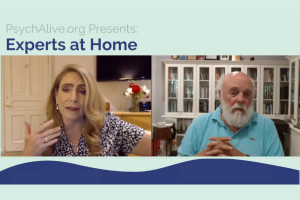How to Fight the Loneliness Epidemic
 Taking on your inner critic may help you feel less lonely
Taking on your inner critic may help you feel less lonely
In the United States, loneliness is currently at epidemic levels. A recent Cigna study of 20,000 U.S. adults found that nearly half of Americans feel like they are alone. Only slightly more than 50 percent of respondents said they had meaningful in-person social interactions on a daily basis, and 50 percent said they sometimes or always feel that their relationships are not meaningful and that they’re isolated from others. A smaller but still surprising number of people (20 percent) said they never or rarely feel close to people, and 18 percent felt like they have no one to talk to.
There is no doubt that loneliness is on the rise. And it affects people of all ages. A survey by AARP, showed that more than 42 million U.S. adults over age 45 suffer from chronic loneliness, while the Cigna study revealed that young people (aged 18-22) are far more likely than senior citizens to report being lonely and in poor health, making them the loneliest generation.
“The most broadly accepted definition of loneliness is the distress that results from discrepancies between ideal and perceived social relationships,” according to the Encyclopedia of Human Relationships. The word I think is the most important in this sentence is “perceived.” Unlike physically being alone, loneliness is a feeling and a perception. It involves a way of seeing ourselves and the world around us. We can feel lonely in a wide array of social settings and circumstances.
Some studies have shown that people who struggle with loneliness may actually perceive the world differently. Researcher John Cacioppo even found structural and biochemical differences in the “lonely brain.” His research revealed that a lonely person can experience more difficulty recognizing positive events and have more trouble picturing the thoughts of others or “mentalizing.”Another University of Chicago study found that “lonely individuals are more likely to construe their world as threatening, hold more negative expectations and interpret and respond to ambiguous social behavior in a more negative, off-putting fashion, thereby confirming their construal of the world as threatening and beyond their control.”
If loneliness is a state of mind, can we change our outlook to feel less lonely? I would argue that we can. And one major way we can do it is by taking on our “critical inner voice.” The critical inner voice is a well-integrated pattern of negative thoughts toward ourselves and others that are at the root of much of our self-limiting and self-destructive behavior. This voice makes us feel like we are different and undeserving. Very often, when people feel their loneliest, they are very much in the company of this inner critic.
Voice Therapy is a cognitive/ affective/ behavioral approach developed by my father Dr. Robert Firestone to help people identify and challenge their critical inner voice. When I’ve used this method with clients who are struggling with feelings of loneliness and isolation, here are some of the “voices” they’ve expressed having toward themselves:
- “No one really cares about you.”
- “You’re such a burden. Who wants to be around you?”
- “Don’t put yourself out there. You’ll only be rejected.”
- “Just stay home tonight. You’re too tired to be around people right now.”
- “No one ever understands you anyway.”
- “You’re going to embarrass yourself.”
- “She doesn’t want you to ask her out.”
- “He has just forgotten about you.”
The spiral of critical thoughts swirling through our minds hurts our confidence and discourages us from making contact with anyone else. Our “voice attacks” can make us feel uneasy and awkward in social interactions, so we’re more likely to avoid them. The problem is, when we give in to our voices, they grow louder and stronger. In order to counter our inner critic, we have to basically do the opposite of what it suggests; we have to seek connection.
Connecting to other people can feel daunting when we’re under the spell of our critical inner voice. That is why the first step to countering our loneliness is to befriend ourselves. We should adopt an attitude toward ourselves that we would extend to any friend experiencing the same circumstances. That means catching on to our critical inner voice and recognizing it as an external enemy rather than accepting it as our real point of view. It means responding to this voice with a more realistic, positive, and compassionate outlook. Finally, it means taking actual active steps to IGNORE its directives. This can be something as simple as taking a walk through our neighborhood, making eye contact or saying hello to someone we encounter. It can be a practice of asking a co-worker about themselves, meeting up with a friend, or making real time to talk to our partner.
Ignoring our inner critic and seeking connection is not only crucial to the quality of our lives, but new research shows relationships can also help us live longer. These relationships extend beyond our significant other and immediate family to include our friends and the community we create around ourselves. One study from Australia showed that strong social networks may lengthen survival in elderly men and women, and that good friends are even more likely to increase longevity than close family members. While strong friendships may seem like an unsurprising contributor to good health, another study from 2014 revealed that “even social interactions with the more peripheral members of our social networks [i.e. acquaintances] contribute to our well-being.” In other words, finding any way big or small to make face-to-face, human contact is a worthwhile pursuit that we should not be dissuaded from by a distorted enemy within. Any step we take toward connection is a step to weaken our inner critic and shift our perspective, not just toward the outside world, but toward ourselves.
Tags: alone, critical inner voice, isolated, isolation, loneliness, lonely, mental health, social isolation, social media, social network5 Comments
Comments are closed.










You have not aknowledged how the culture in the USA limits the ability to interact with other people and encourages isolation. Many other world cultures are more communal, welcoming, friendly and open to strangers. In the USA, we have been subliminally trained to fear and mistrust strangers and to perceive anyone we don’t know as a potential threat. This mentality makes it virtually impossible to break through in order to initiate new friendships. Even smiling at someone on the street elicits a fight or flight response, so how can we be expected to “put ourselves out there” when rejection is the culturally condoned reaction to any attempt to establish a human connection?
I am 68–a product 0f the mixedup Woodstock
gen. I was a middle child, sister 5 yrs.younger,
had mult. disabilities (developmental,bipolar,
epilepsy, etc.) My 5 yrs, older was in my father’s scrap metal business for 35 years, made a lot of money. I felt I had no connection to my mother or father–wanted to bed “special” like Albert Einstein. First major in college was Physics–too difficult, then Engineering, joined US Coast Guard (OCS–dropped out of basic training), back to technical sales, earned MS Marine Bio, wrote Thesis and academic publication. had
many professional careers kept switching finally to people jobs, vocational counselor for MI population then earned MS-Mental Health Counseling, became LMHC & NCC. I was not aware that all of this stuff was going-on. My 1st therapist was a relative who was a Psychiatrist/Psychoanalyst who never said anything in session–“blank screen transference”. I next had the opportunity for REBT with Dr. Albert Ellis; I liked him, but was not ready to make use of all the CBT insights. I still struggle; I am not working for the past 3 years. I live with my girlfriend; we are now raising a 3 year old foster child. Her grandson (the boy’s father and the girlfriend (the boy’s mother)
got in trouble with Child Protective Services
My girlfriend (the Great Grand Mother) has full custody of the 3 yr old boy. Some Story!
Interesting perspective. My thinking isn’t that we’re conditioned to not trust, but rather the “go-getter”, stay busy to feel good ideal based on extreme extroversion are held up as the norm.
Whatever the origins, I think the problem is that people are aching for deeper interactions that bring connections. This, I think, is why books like “Quiet: The Power of Introverts in a World That Can’t Stop Talking” have done well. It’s not that being an extrovert or driven (I am the latter) is bad. It’s that it is viewed positively and introvert traits are viewed negatively.
Loneliness is a big problem of modern civilization.
Interesting article however I feel the best way to make connections is through hobbies/ interests. I live in a major city and even smiling at people does not guarantee a positive response.
I think one of the major issues with loneliness I have found is that after a while you become wary of people and hesitant, cauticias. It makes you retreat.
Making friends and connections comes with alot of rejections and the older you get the harder it is is.
Being lonely with few friends can make a person feel like a loser and I know it has affected my self confidence and self esteem.
I don’t have the answers but I know making any connections – social or deeper is not easy. Not in my experience especially if one is shy,has SA or is introverted.
It would not surprise me if most of the people who are lonely have all or some of these traits. Let’s not forget those with autism and Asperger’s.